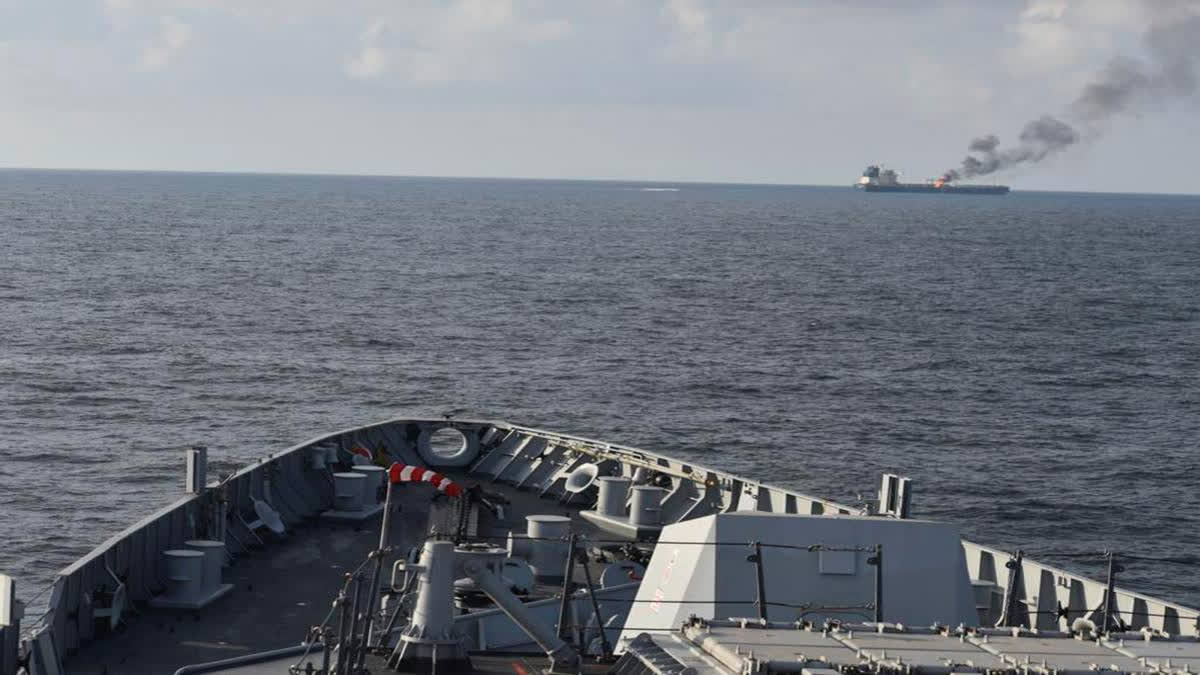Tel Aviv (Israel): Two ships traveling in Middle East waters were targeted by Yemen Houthi rebel ballistic missile fire early Tuesday, authorities said, in the latest assaults in the Iranian-backed fighters' campaign of targeting vessels over Israel's war on Hamas in the Gaza Strip.
The first attack happened in the southern part of the Red Sea, west of the Yemeni port of Hodeida, with the projectile causing "slight damage" to the Barbados-flagged, United Kingdom-owned cargo ship Morning Tide's bridge windows, the British military's United Kingdom Maritime Trade Operations said. A small vessel had been nearby the ship before the attack, it added.
The Houthis carried out the attack using three anti-ship ballistic missiles, the United States military's Central Command said early Wednesday.
The Morning Tide's owner, British firm Furadino Shipping, told The Associated Press no one was hurt in the attack and the ship was continuing onward to Singapore.
A second ship, the Marshall Islands-flagged, Greek-owned bulk carrier Star Nasia, also came under fire from three Houthi ballistic missiles, Central Command said. The USS Laboon, an Arleigh Burke-class destroyer, shot down one missile, the military said. An explosion from one of the missiles caused "minor damage but no injuries" on the Star Narsia, the Central Command said.
A military spokesperson of the Iranian-backed Houthi rebels, Brig. Gen. Yahya Saree, claimed both attacks in a statement.
Since November, the rebels have repeatedly targeted ships in the Red Sea over Israel's offensive in Gaza. But they have frequently targeted vessels with tenuous or no clear links to Israel, imperiling shipping in a key route for trade among Asia, the Mideast and Europe.
In recent weeks, the United States and the United Kingdom, backed by other allies, have launched airstrikes targeting Houthi missile arsenals and launch sites for its attacks.
The U.S. and Britain struck 36 Houthi targets in Yemen on Saturday. An air assault Friday in Iraq and Syria targeted other Iranian-backed militias and the Iranian Revolutionary Guard in retaliation for a drone strike that killed three U.S. troops in Jordan.
Central Command also acknowledged an attack Monday on the Houthis, in which they attacked what they described as two Houthi drone boats loaded with explosives.
American forces "determined they presented an imminent threat to U.S. Navy ships and merchant vessels in the region," the military said. "These actions will protect freedom of navigation and make international waters safer and more secure for U.S. Navy vessels and merchant vessels."
Separately, the White House on Tuesday walked back an earlier statement that it had alerted the Iraqi government prior to carrying out Friday's Iraq and Syria strikes. National Security Council spokesperson John Kirby told reporters shortly after the strikes that Iraqi official were given advance warning about the U.S.-led operation. He said the assertion was based on information that was provided to him by U.S. officials.
"Turns out that information was incorrect," said Kirby. He added that he regretted the error.
Kirby's initial comments generated controversy in Iraq and vehement denials by officials in Baghdad. Iraqi Prime Minister Mohammed Shia al-Sudani has sought to walk a delicate line between the U.S. and Iran-backed armed groups in his country, many of which have associated political parties in the coalition that brought his government to power.
Sudani has condemned attacks on American troops, but has also pushed back against U.S. retaliatory strikes. Some of those strikes have hit facilities connected to the Popular Mobilization Forces, a coalition of mostly Shiite, Iran-backed militias that was officially made part of the Iraqi military after joining the fight against the Islamic State in 2014 — although in practice, the militias continue to operate largely outside of state control.
Sudani has also called for an end to a U.S.-led coalition formed to fight IS. Some 2,500 U.S. troops are stationed in Iraq as part of the mission. In late January, Iraqi and U.S. military officials launched a series of formal discussions on winding down the coalition's presence. The talks were then suspended after the Jan. 28 strike in Jordan that killed three U.S. troops, but are expected to resume again in the coming weeks.
Iraq's representative to the United Nations, Abbas Kadhim Obaid, speaking Tuesday as the U.N. Security Council met, condemned the U.S. strikes, as well as recent strikes launched by Turkey and Iran on Iraqi turf, as a breach of the country's sovereignty.
Read More
- Explained: Why India is worried about Houthi attacks on ships passing through Red Sea
- Houthi attacks on ships passing through Red Sea: How it will impact Indian economy
